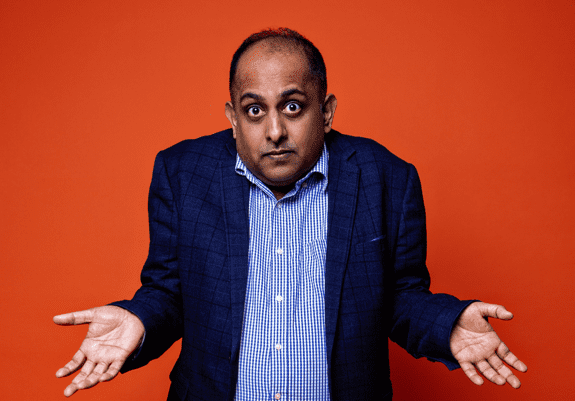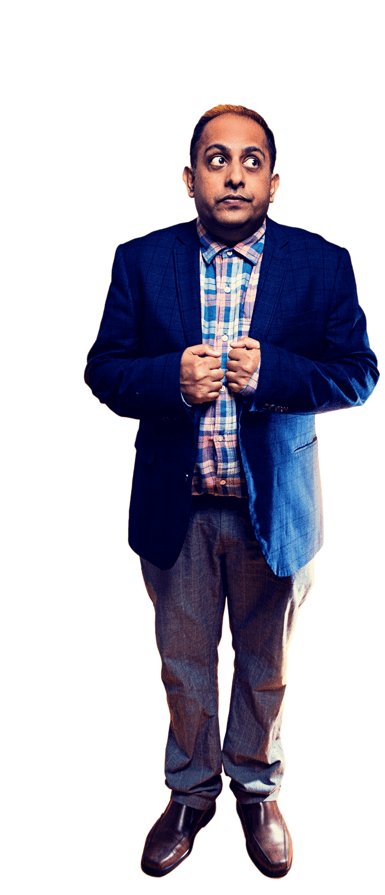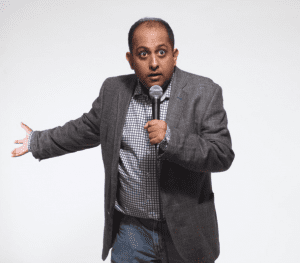- Wednesday, April 23, 2025
The latest offering from the Indian stand-up comedian Anuvab Pal The Department of Britishness is a laughter-filled look at embracing Britishness

By: Asjad Nazir
A STAND-OUT show at this year’s Edinburgh Fringe is The Department of Britishness. The latest offering from acclaimed Indian stand-up comedian Anuvab Pal is a laughter-filled look at embracing Britishness and continues his strong run of live UK performances.
It also adds to an impressive body of work that has included an Amazon special, along with writing films, theatre plays and books. Described by the New York Times as India’s most intelligent comedian, his career has been filled with many laughter-filled moments. Eastern Eye caught up with the fabulously talented funny man to speak about his Edinburgh Fringe show, comedy journey, Disco Dancer obses – sion, Britishness and unique inspirations.
Which of your wide variety of work has been the closest to your heart?
Each has its appeal. I’m quite a terrified performer. I enjoy writing and giving those lines to actors, so I can watch from the side and laugh with audiences. I always prefer that. In that regard, I’d say the films and plays.
Which was a favourite?
Chaos Theory, a play I wrote, sort of became probably the most popular thing I’ve done. And that’s quite nice because you don’t have to get involved. You can see great actors do their thing.
You have become a trailblazer for Indian comedy and brilliantly taken stories from India to the world. What has it been like doing that in UK?
I do enjoy the division in my life. I like being in India and getting the stories because I don’t have the experiences very good British Asian comedians have of life in England. I’m interested in differentiating and bringing stories from some completely alien place. It’s nice to sort of not talk about trains, Lidl and Tinder and come up with stories and see if they work.
Did your Edinburgh Fringe show get inspired by finding the middle ground between Britain and India?
Yeah, I think so. That’s always been my interest in all my writing. I mean, there are other stories. I spent time in America and am always interested in what is going on in India. My main interest has always been sort of the aftermath of the (British) Empire. Like, what’s happening with British Asian communities and the role of Britain in India. Both ways. That bridge has been very interesting to me.
Tell us a little more about your Edinburgh Fringe show?
The Department of Britishness is where I’m making a pitch for more Britishness in India and the world generally and how great this country is and why we need to love it more. It’s slightly different and a character piece. I’m still myself, but playing a person who is defeated, broken and divorced. Then you realise he has a notorious reason for wanting Britishness because he’s been thrown out of his country and can’t go back. So, it’s a bit different.
What is it like doing stand-up comedy as a character?
I really like character work because I can hide and don’t have to be myself. The character can say ludicrous things. But it’s not a character with a different name, or a moustache or any of that. It’s sort of stand-up, but it’s not me entirely.
Is it pressuring, scary or motivating being part of a festival that’s got thousands of shows?
All those things. I couldn’t have done it at the age of 20. I’ve been doing standup now for 17-18 years. I wouldn’t be able to handle the highs, lows, great reviews and terrible ones and going from sold out to four people in the audience. It happens to everyone, but I couldn’t have handled that if I was 25.
How do you mentally prepare for something like this where there are thousands of shows to compete with?
I think the main thing is consistency. You have to shut off all the noise. You open social media and somebody’s show is getting five-star reviews, someone has been called a genius and no one’s showing up to your show. You realise on August 29 (at the end), that none of it matters. While you’re there, you think the whole world is revolving around you, but it doesn’t matter.
How do you stay mentally focused?
It’s mentally really hard. You can’t shut off, but you can’t engage too much with Twitter and Instagram and see what everyone else is doing. I don’t have a formula but try to not go out. I just do my show, try to watch a couple of shows and not get carried away by the reviews, good or bad. And not sort of bother about industry professionals in the audience. And I think I can only do that because I’m 47 and on the other side of it.
What according is the secret of a good stand-up set?
I don’t think it’s the jokes. I think it’s authenticity and truth. I think knowledge is very important to be a stand-up comedian. If you know enough and read enough and are authentic about your experiences and truthful, people will laugh. When you’re trying too hard to look for a joke, it’s inauthentic.
Who’s your comedy hero?
I’d say it’s Eddie Izzard. I’ve been a huge fan for a long time. I came from script writing to comedy and he was the only person I saw who was like doing full scripts of movies on stage alone. He was playing all the parts. I found that really interesting.
Tell us about your love of Bollywood film Disco Dancer?
I’ve been obsessed with that film. I did an Edinburgh show a few years before the pandemic about the story of Disco Dancer. I was obsessed because I thought that was the greatest comedy Bollywood had ever done. The producer sued me for criminal defamation because I called it a comedy. He said it was a tragedy. I got into this philosophical debate with him about whether it’s a comedy or tragedy.
How did you end up writing a brilliantly funny book on it?
I wanted to write the book because there’s no other Bollywood film that ends its climax with a disco dancing face-off between the hero and villain, where the villain dies because he’s outdanced by the hero. There’s nothing like this in the world. It’s got some of the greatest moments. (Laughs) I mean, the side villain is a guy called Murderer From London. That’s the character’s name. He only shows up in Mumbai to murder disco dancers. Things in that movie were so ahead of its time. My publisher had asked comedians to write books about Bollywood and people picked great classics like Sholay. I wanted to do Disco Dancer – they said it’s one of the worst films ever made. I said, no, it’s one of the greatest.
You have had a prolific comedy career. Is there something you haven’t done yet, but would love to?
I would really love to write and hopefully direct a sitcom because I think the world is in a very interesting place. The thing about south Asians in Britain that I’ve always been interested in, is not race or ethnicity, but entrepreneurship. I’ve been very interested in how the south Asian mind works in terms of business and money, how different it is from, other British people. I’ve always wanted to write a sitcom about that.
 Tell us more about that?
Tell us more about that?
Everywhere I go in the world, south Asians are far wealthier than everybody else and don’t talk about it, or make a lot of noise about it. They stay within their weddings, events and Diljit Dosanjh concerts, but they’re tremendously wealthy and far more than other communities. I’ve been wanting to explore that in a sitcom. I’ve always been a huge fan of things like The Kumars at No. 42, Goodness Gracious Me and Faulty Towers. So, if I can write a sitcom for great British actors, or comedians, I’d be very happy.
Do you ever get nervous before you go on stage?
Every time, for 20 years. I get physically sick. Even yesterday, I had a sold-out friendly audience and was terrified. I get no joy out of it. The joy is when the jokes work.
Are you under pressure to be funny in real life?
My wife is quite funny. So that burden is a little less on me in my private life because she’s sort of the more jokey one at home and I’m the quieter one.
What inspires you?
Awkwardness and conflict. Those are the two things that really inspire me, particularly awkwardness. Any sort of social or historical awkwardness. Any sort of discomfort is great for comedy.
Which British quality have you adopted or love?
What I love about Britain is the constant self-doubt. I could ask, how was your day Asjad? You could have written the best article ever and would say, ‘not bad’. I love that. India is a very ‘can do’ country and everyone’s always boasting. I think it happens if you’re a poor country for a long time – you come into your own and want to tell the world, but I’m very uncomfortable with that. I mean, here, no matter how well people do they will always be like, yeah, it’s okay. Everyone’s a little bit miserable. I love that.
Why do you love comedy?
I just find straight life and everyday conversations quite boring. If you can’t adjust it or twist it in some way and can’t see the fiction in every little thing, you know, what’s the point? I’ve never been excited by money, success, or those sorts of things. I’ve always thought that comedy is just sort of life but tweaked a little bit.